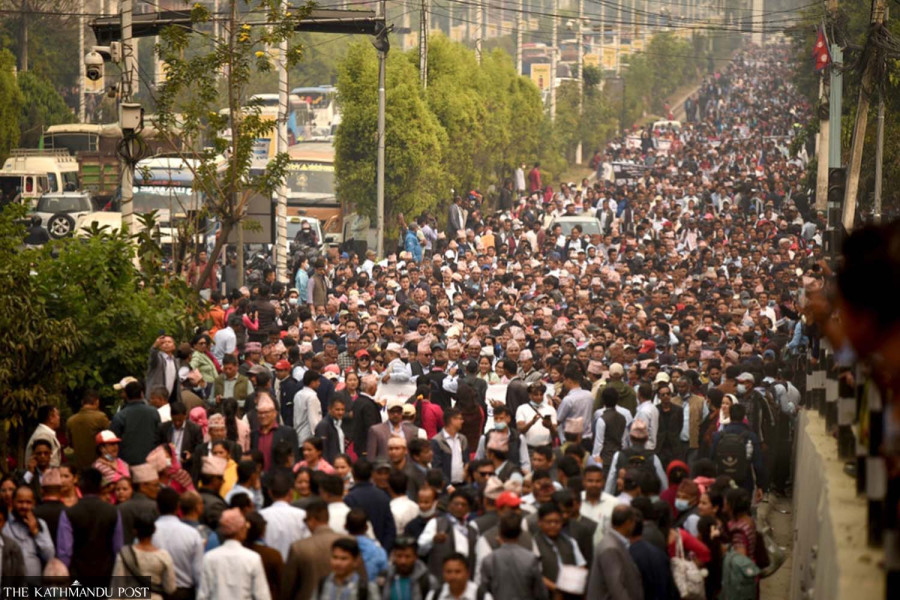National
Create environment for teachers to return to duty within three days: Supreme Court
Local units have also started asking protesting school teachers to conduct classes pronto.
Binod Ghimire
The Supreme Court has ordered the government to ensure the protesting school teachers return to classrooms within three days while local units have also started directing the teachers to take up their duties.
Issuing an interim order in a writ petition by advocate Shrawan Chaudhary, the top court said that the protest has, prima facie, denied the students their right to education and it would continue if the court doesn’t intervene.
“With regard to addressing the legitimate and constitutionally justified demands of the protesting teachers, the defendants [the prime minister’s office and other government agencies] are hereby directed to take appropriate and necessary decisions, and to ensure, within three days from the date of receipt of this order, that the protesting teachers return to their schools and that an environment conducive to regular teaching and learning is restored,” reads the order by a single bench of Justice Nahakul Subedi.
It has also directed the Ministry of Education to report to court within four days whether its order has been implemented. The bench has also asked the relevant authorities to ensure the Secondary Education Examination results are published on time and there is no postponement of the grade 12 examinations, according to Nirajan Pandey, information officer at the court.
The ruling is in line with the directives of many local units who had asked the agitating teachers to return to the classroom, arguing that the school shutdown has violated students’ right to education.
Local governments have directed teachers to resume their work as the private schools commence their classes, while the public schools remain shut. The new academic session began on April 16. Though most private schools have already started teaching-learning, the state-funded schools are yet to begin admissions due to the agitations.
The Teachers’ Federation Nepal, an umbrella body representing school teachers, has been staging demonstrations for the past 23 days, demanding immediate promulgation of the School Education Act that incorporates their demands.
“While study has already commenced in the private schools, the community schools remain shut. This is against children’s right to study,” Budhanilkatha Municipality said in a statement. “All the teachers are directed to resume their jobs.”
The Mandandeupur Municipality of Kavre has also issued a similar directive. “The municipality firmly believes that children’s education should not be disrupted under any circumstances,” said the municipality in a statement. Both the local units have requested the federal government to address the legitimate concerns of the agitating teachers.
The agitating teachers are adamant on continuing their demonstrations until the Act is passed and their concerns are addressed. Assurance of pay and perks at par with those of civil servants is their major demand.
The list also includes payment of grades, allowances to relief quota teachers, separate dedicated hospital or health checkups at a discounted price at the Civil Service Hospital. Permanent status for the temporary teachers through internal competitions is another demand.
Allowing them to work under the federal government is another demand, though they are downplaying it following criticism that it is against the spirit of the constitution.
Local governments have said the ongoing protest will affect the academic calendar if the teachers do not return to work immediately.
Their protest forced the National Examination Board to postpone the grade 12 final tests by 10 days, to May 4.
But the examination controller’s office has said that the SEE results will be announced by June 21—within three months of the test. Teachers have refused to evaluate the answer sheets until the bill is endorsed. Similarly, school enrolments that were slated to begin on April 16 have been halted.
Stating that the teachers should fulfil their responsibility, Harinas Municipality Lamjung has said, “The salary would be released only for the days the teachers have worked.” The local units pay the school teachers and staff from the budget allocated by the federal government.
Despite the court judgement and many local units’ decision, the agitating teachers say they will not withdraw the protest without the Act’s promulgation.
“What is the court’s position in ensuring justice to us? We want a long-term solution to the problem,” Nanu Maya Parajuli, co-chair of the federation, told the Post. “The protest will not cease without the Act. However, we will come to a formal decision only after studying the court order and consulting with our friends.”
The School Education Bill is under consideration at the Education, Health and Information Technology Committee of the House of Representatives. A panel under Chhabilal Biswakarma is working on a daily basis to finalise it.
As many as 161 lawmakers from the ruling and opposition parties have registered 1,758 amendments to the bill. Despite lengthy discussions, there have yet to come to agreements on half of them.
The panel is finding it hard to agree on provisions related to teacher management and regulation of private schools. It has until May 4 to submit the final report to the House committee.
Endorsement of the bill is unlikely before May 10 even if the parliamentary process moves ahead smoothly.




 11.12°C Kathmandu
11.12°C Kathmandu















